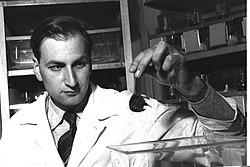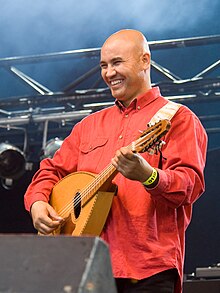Leo Sachs
Leo Sachs | |
|---|---|
 Leo Sachs, 1955 | |
| Born | 14 October 1924 Leipzig, Saxony |
| Died | 12 December 2013 (aged 89) |
| Nationality | Israeli |
| Scientific career | |
| Fields | Molecular biology |
Leo Sachs (Hebrew: ליאו זקס; 14 October 1924 – 12 December 2013) was a German-born Israeli molecular biologist and cancer researcher.[1] Born in Leipzig,[2] he emigrated to the United Kingdom in 1933, and to Israel in 1952. There he joined the Weizmann Institute of Science.
Biography
Leo Sachs moved to Britain with his family in 1933 following Hitler's rise to power. In 1952 he received a BSc from the University of Wales in Bangor. His original dream was to help establish a kibbutz in Palestine, and he even spent two years as a farm laborer, milking cows. But the doors to Palestine were virtually closed by the British, so Sachs began studying agricultural botany at the University of Wales, became fascinated along the way by genetics and development, and ended up completing a PhD in genetics in 1951 at Cambridge University.
Upon moving to Israel, he began to contribute to the fledgling country in the way he knew best – as a geneticist at the Weizmann Institute. Because there were no animal studies yet at the Institute, Sachs started working on a theory that human amniotic fluid, which bathes the baby in the womb, contains fetal cells that provide information about the fetus. His research proved him right, showing that these cells can be used to determine the baby's gender and other important genetic properties. Sachs's research formed the basis for amniocentesis, the widely used prenatal diagnosis of human diseases.
Eventually, Sachs secured his own laboratory and a supply of mice and began working on a question that would anchor his research throughout: What controls normal development and what happens when development goes wrong? Why does the machinery in cancer cells run amok, causing abnormal proliferation? Focusing on blood stem cells, a small group of bone marrow cells that produce some 200 billion new blood cells every day, Sachs ended up, in 1963, designing the first cell culture system able to grow, clone, and induce the development of different types of normal blood cells. Using this process, he subsequently discovered and identified a family of proteins that plays a key role in controlling normal blood cell development. Later named colony stimulating factors (CSF) and interleukins, one of these CSF proteins is now used worldwide in a variety of clinical procedures, including boosting the production of infection-fighting white blood cells in cancer patients undergoing chemotherapy or radiation, and improving the success of bone marrow and peripheral blood cell transplants.
삭스는 또한 처음으로 악의적인 행동이 번복될 수 있다는 것을 보여주었다. 그는 그가 확인한 단백질이 다른 화합물과 함께 백혈구 세포를 다시 올바른 궤도에 올려놓음으로써 정상 행동의 성숙한 세포로 분화하도록 유도한다는 것을 보여주었다. 이 접근법은 화학요법과 결합된 레티노산을 사용하는 것으로, 현재 인간 프로멜로피성 백혈병을 치료하는 표준 절차로, 생존율을 크게 높였다.
바이즈만 연구소에서 유전학과 바이러스학과를 설립하였으며, 1962년부터 1989년까지 27년간 연구소의 유전학부장을 역임하였다. 게다가 1974년과 1979년 사이에 그는 바이즈만 생물학 교수로 재직했다.
수상 및 명예
- 1965년 그는 유럽 분자생물기구의 회원으로 선출되었다.
- 1972년 삭스는 자연과학으로[3] 이스라엘상을 받았다.
- 1975년 그는 이스라엘 과학 인문 아카데미 회원으로 선출되었다.
- 1977년 삭스는 생물학 분야에서 로스차일드 상을 받았다.
- 1980년, 그는 울프 의학상을 수상했으며,[4] "그의 ...에 대한 연구를 통해 체세포의 기능과 기능장애에 대한 지식의 공헌"으로 최초의 이스라엘 과학자가 되었다. 정상 세포와 암 세포의 통제와 분화를 지배하는 메커니즘의 해명"
- 1983년 삭스는 뉴욕 암 연구에서 뛰어난 업적으로 브리스톨 마이어스 스퀴브 상을 받았다.
- 1985년 그는 프랑스 보르도 대학교의 호니스 코로사 박사로 선출되었다.
- 1986년 삭스는 런던 왕립 협회 웰컴 재단상을 수상했다.
- 1989년에 삭스는 알프레드 P를 받았다. Sloan Prize, General Motors Cancer Research Foundation, 뉴욕 주(州)의 Sloan Prize
- 1995년에는 미국 국립과학원(NAS)의 외국인 어소시에이트로 당선되기도 했다.
- 삭스는 1996년 암 연구의 선구자적 업적으로 예루살렘 샤레 제덱 메디컬 센터가 매년 수여하는 오트 하나기드(지사의 메달) 상을 받았다. 발표회는 "그는 그 중 집단 단백질 집단을 발견해 확인했다"면서 "혈액줄기세포의 생존성과 성장, 그리고 다른 형태의 성숙한 혈액세포로의 발달을 조절하는 몇몇 인터루킨을 발견했다"고 언급했다. 또한 1950년대 그의 "태아의 유전적 특성을 진단하기 위한 양수 사용에 관한 연구"가 오늘날 인간 질병의 태아 진단에 기초가 되었다고 언급했다.[5]
- 1997년에 그는 왕립 학회의[6][7] 회원으로 선출되었다.
- 1998년 그는 외국인 회원인 Europaea 학회에 선출되었다.
- 1999년, 그는 뱅고르 웨일즈 대학교 명예 회원으로 선출되었다.
- 2000년에 그는 샌프란시스코의 미국혈액학협회 햄-워서먼 강의에 선출되었다.
- 2001년에는 국제사이토카인협회 명예생명회원상을 받았다.
- 2002년에는 생명과학, 의학, 유전학 분야에서 에멧상을 수상하였다.
참고 항목
참조
- ^ Efrati, Ido (15 December 2013). "Prof. Leo Sachs, one of Israel's first geneticists, dies at 89 – National Israel News". Haaretz. Retrieved 15 December 2013.
- ^ "Who's who in the State of Israel". 1958. Retrieved 15 December 2013.
- ^ "Israel Prize Official Site – Recipients in 1972 (in Hebrew)".
- ^ Wolf Prize Medicine 2009년 2월 26일 웨이백 머신에 보관된 Wolf Prize 수상자
- ^ "Shaare Zedek Honors Weizmann Institute's Prof. Leo Sachs". Archived from the original on 8 November 2005.
- ^ "Fellows". Royal Society. Retrieved 18 October 2010.
- ^ Groner, Yoram; Sachs, Pnina; Lotem, Joseph (2019). "Leo Sachs. 14 October 1924—12 December 2013". Biographical Memoirs of Fellows of the Royal Society. 66: 355–375. doi:10.1098/rsbm.2018.0027. S2CID 86855775.


